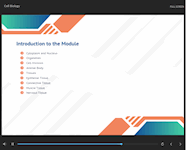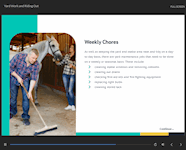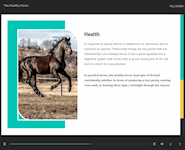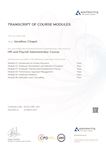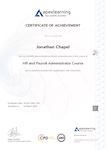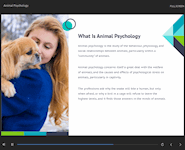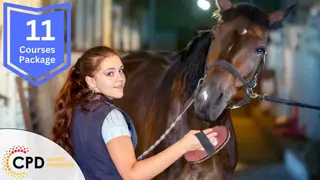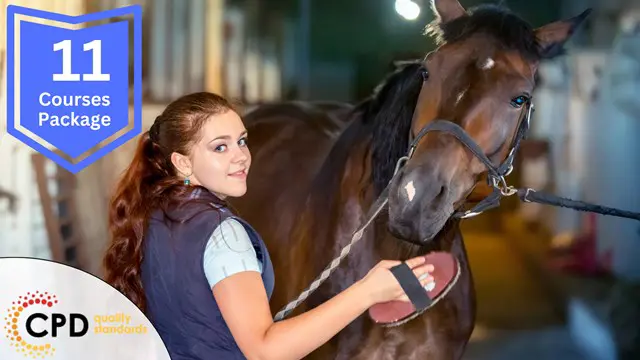
Horse Care Online Training
Winter Flash Sale | 11 Courses Exclusive Bundle| Free Gift Hardcopy + PDF Certificate + SID - Worth £160
Apex Learning
Summary
- Certificate of completion - Free
- Exam(s) / assessment(s) is included in price
- Tutor is available to students
Add to basket or enquire
Overview
Would you wish to learn how to care for your horse like a pro which includes: tips on feeding, grooming, and general health? Would you want to discover the joy of making a stronger bond with your horse by learning best practices? If the answers are yes, then enrol in our course now before it’s too late.
This course investigates the fundamental behavioural patterns of horse psychology as well as the results of domestication and evolution. Likewise, it discusses the etiquette of horses at various times of reproduction, as well as some of the most frequent behavioural issues, their causes, and the suggested preventative measures and therapies. Then it discusses the basic information needed to care for horses and comprehend their habits.
Furthermore, you will learn many elements of a foal's growth may be determined and controlled by recognising the behaviours of newborn horses.
Consequently, it explores how horses regulate their social surroundings and examine the functions of stallions, mares, and young animals in natal groups and the social structure, as well as the influence of status on behaviour. Horse training may be enjoyable and difficult but don’t worry; you will learn how to train horses in this course by being guided through skills and methods, including operant conditioning, classical conditioning, reinforcement, and punishment. Lastly, learn about the techniques for helping a horse to overcome fears.
So, why wait? Enrol in our Horse Care course today and discover a world of knowledge and opportunity.
Learning Outcome
After this course, you will be able to:
- Describe the types of horse language.
- Understand the development process of horses.
- Explore how domestication has affected horse behaviour.
- Determine the various ways in which horses attempt to communicate with one another.
- Outline the reproductive habits of the stallions and mares.
- Highlight the advantages of horses and how they connect with humans.
- Compile a list of the social interactions that horses have with their surroundings.
This Bundle Consists of the following Premium courses:
- Course 01: Horse Care and Stable Management
- Course 02: Animal Science
- Course 03: Animal Behaviour and Psychology Level 2
- Course 04: Animal Nutrition & Diet
- Course 05: Veterinary Nursing and Medical Emergencies Level 4
- Course 06: Training for Puppies
- Course 07: Feline Behaviour & Psychology
- Course 08: Pet First Aid
- Course 09: Infection Prevention Training
- Course 10: Pet Business Course
- Course 11: Personal Hygiene
As one of the top course providers in the UK, we’re committed to providing you with the best educational experience possible. Our industry experts have designed the Horse Care to empower you to learn all at once with accuracy. You can take the course at your own pace — anytime, from anywhere.
So, enrol now to advance your career!
Benefits you’ll get choosing Apex Learning for this Horse Care:
- One payment, but lifetime access to 11 CPD courses
- Certificate, student ID for the title course included in a one-time fee
- Full tutor support available from Monday to Friday
- Free up your time — don’t waste time and money travelling for classes
- Accessible, informative modules taught by expert instructors
- Learn at your ease — anytime, from anywhere
- Study the course from your computer, tablet or mobile device
- CPD accredited course — improve the chance of gaining professional skills
How will I get my Certificate?
After successfully completing the course you will be able to order your CPD Accredited Certificates (PDF + Hard Copy) as proof of your achievement.
- PDF Certificate: Free (Previously it was £10 * 11 = £110)
- Hard Copy Certificate: Free (For The Title Course)
If you want to get hardcopy certificates for other courses, generally you have to pay £20 for each. But this Fall, Apex Learning is offering a Flat 50% discount on hard copy certificates, and you can get each for just £10!
P.S. The delivery charge inside the U.K. is £3.99 and the international students have to pay £9.99.
CPD
Course media
Description
Curriculum of the Bundle
Course 01: Horse Care and Stable Management
- Module 01: Introduction to Stable Management
- Module 02: Environment
- Module 03: Diet
- Module 04: The Healthy Horse
- Module 05: Nursing the Sick Horse
- Module 06: Tethering
- Module 07: Plants Poisonous to Horses
- Module 08: Zoonotic and Notifiable Diseases
- Module 09: Pre-purchase Vetting
- Module 10: Yard Work and Riding Out
- Module 11: Health and Safety
- Module 12: Manure Management
- Module 13: Travelling Horses
Course 02: Animal Science
- Module 01: Principles of Animal Science
- Module 02: Animal Anatomy and Physiology
- Module 03: Cell Biology
- Module 04: Biochemistry
- Module 05: Animal Microbiology
- Module 06: Genetics and Evolution
- Module 07: Animal Nutrition
- Module 08: Animal Disease and Medicine
- Module 09: Animal Behavioural Ecology
- Module 10: Pet Care
- Module 11: Wildlife Management
- Module 12: Animal Welfare
Course 03: Animal Behaviour and Psychology Level 2
- Module 01: Introduction to the Care and Animal Welfare of All Species
- Module 02: Basic Animal Health & Nutrition
- Module 03: Hygiene and First Aid for Animal
- Module 04: Getting to Know the Dogs & Puppies
- Module 05: Getting to Know the Kittens and Cats
- Module 06: Learning about Horses
- Module 07: Learning about Birds
- Module 08: Specific Information on Rabbits & Guinea-Pigs
- Module 09: Specific Information on Ornamental Fish
- Module 10: Specific Information on Reptiles
- Module 11: Animal Psychology
Course 04: Animal Nutrition & Diet
- Module 01: Animal Care & Welfare
- Module 02: Animal Nutrition
- Module 03: Basic Animal Health
Course 05: Veterinary Nursing and Medical Emergencies Level 4
- Module 01. Introduction to Veterinary Nursing
- Module 02. Basic Care and Animal Welfare of All Species
- Module 03. Career Prospect and Development
- Module 04. Veterinary Nursing Legislation
- Module 05: Collapse & Unconsciousness
- Module 06: Cardiopulmonary Resuscitation
- Module 07. Shock
- Module 08. Bleeding
- Module 09. Bandage
- Module 10. Fractures
- Module 11. Seizures
- Module 12. Choking & Drowning
- Module 13. Heat Stroke & Hypothermia
- Module 14. Burns & Scalds
- Module 15. Poisoning
- Module 16. Bites and Stings
- Module 17. Common Emergencies
- Module 18. Managing a First Aid Scenario
- Module 19. Pet First Aid Kit
Course 06: Training for Puppies
- The Proof Is In The Pudding - This Is What People Say
- Here's What You'll Get From This Course
- How To Choose The Right Puppy For You And Getting Ready To
- Bring Them Home
- The 4 Top Puppy Problems Answered
- More Puppy Questions Answered
Course 07: Feline Behaviour & Psychology
- Module 01: Domestication of Cats
- Module 02: Communication & Stress According to Origin
- Module 03: Sleeping & Toileting According to Origin
- Module 04: Hunting & Drinking Water According to Origin
- Module 05: Reproduction & Disease According to Origin
- Module 06: Another Type of Cats – Feral Cats
- Module 07: Understanding Feline Body Language
- Module 08: Understanding Common Behaviour
- Module 09: Understanding Cat Communication
- Module 10: Types of Feline Need
- Module 11: Do Cats Feel Love and Other Human Emotions?
- Module 12: How Smart Are Cats?
- Module 13: Why Do Cats Hiss?
- Module 14: Why Do Cats Purr?
- Module 15: Why Do Cats Rub Against Things?
- Module 16: Why Do Cats Scratch Things?
- Module 17: Why Do Cats Play with Their Prey?
- Module 18: Why Do Some Cats Become Anxious or Phobic?
- Module 19: Why Do Cats Roll on Their Backs to Greet People?
- Module 20: Why Do Cats “Sulk”?
- Module 21: Why Do Cats Knead or Paddle with Their Paws?
- Module 22: Why Does a Male Cat Bite a Female’s Neck While Mating?
- Module 23: Why Do Mother Cats Move Kittens?
- Module 24: Why Do Some Cats Howl, Especially at Night?
- Module 25: Cats and the Law
- Module 26: Bringing Your New Cat Home
- Module 27: Feeding and Controlling Obesity
- Module 28: Managing Your Cat’s Behaviour
- Module 29: Keeping Your Cat Safe
- Module 30: Neutering – Family Planning for Felines
- Module 31: Pregnant Cats, Birth and Care of Young Kittens
- Module 32: Cats Living Together
- Module 33: How to Prevent Cat Conflicts in Multi-cat Households
- Module 34: When to Let Go
Course 08: Pet First Aid
- Module 01: Basics of First Aid
- Module 02: Handling Fracture and Injuries
- Module 03: Stings, Bites and Burns
- Module 04: Impalement Injuries, Drowning and Choking
- Module 05: Pet First Aid for Fainting, Fever and Dehydration
- Module 06: First Aid for Breathing Problems
- Module 07: Diarrhoea and Vomiting
- Module 08: Treatment for Difficult Labour and Poisoning
- Module 09: Straining, Sunburn and Wounds
- Module 10: Shock and Regular Check-Ups
- Module 11: Cardiopulmonary Resuscitation (CPR)
- Module 12: Tips for Handling Pets
Course 09: Infection Prevention Training
- Module 01: Infection Prevention and Control Policy in the UK
- Module 02: Principles of Prevention and Control of Infection
- Module 03: Immunization
- Module 04: Infections Spread by Food and Water
- Module 05: Infections Spread by Animals and Insects, and Less Common Infections Found in the UK
- Module 06: Infections & Diseases Spread by Person-to-Person Contact
- Module 07: Infections Spread by Sexual Contact
- Module 08: Infections Spread by Blood and Body Fluids
Course 10: Pet Business Course
- Introduction
- Legal Requirements
- Running Your Own Business
- Marketing
- Setting Your Prices
- Business Costs
- Forms & Record Keeping
- Pre-Service Visit
- Difficulties & Challenges
Course 11: Personal Hygiene
- Module 01: Introduction to Personal Hygiene and a Brief History
- Module 02: Looking Clean, Smelling Clean
- Module 03: Improving and Maintaining Oral Health
- Module 04: Care of the Eyes
- Module 05: Ear Care Secrets
- Module 06: Foot & Nail Care in Personal Hygiene
- Module 07: Hair Care Hygienic Ways
- Module 08: Hygienic Approach to Skin Care
- Module 09: Maintain Good Toilet Hygiene
- Module 10: Potential Hygiene Guidelines
- Module 11: Personal Hygiene During Coronavirus Pandemic
Who is this course for?
The Horse Care course is for anyone with interest in horses and horsemanship, including:
- Aspiring equestrians and horse owners who want to learn how to provide the best possible care for their horses.
- Horse enthusiasts who want to deepen their knowledge and understanding of these magnificent animals.
- Career-minded individuals seeking to pursue a career in the horse industry, such as a stable hand, groom, or instructor.
- Anyone who wants to improve their horse handling skills and become a confident horse caregiver.
- Animal lovers looking to make a positive impact on the lives of horses.
Requirements
Our Horse Care is fully compatible with PC’s, Mac’s, Laptop, Tablet and Smartphone devices. This course has been designed to be fully compatible with tablets and smartphones so you can access your course on Wi-Fi, 3G or 4G.
There is no time limit for completing this course, it can be studied in your own time at your own pace.
Career path
After successfully completing the course, the learner will have a wide range of opportunities to pursue a career in the relevant field. Here are some career choices one could go for:
- Horse Groom: £12,000 to £18,000
- Horse Riding Instructor: £14,000 to £25,000
- Animal Care Worker: £14,000 to £24,000
Questions and answers
Currently there are no Q&As for this course. Be the first to ask a question.
Certificates
Certificate of completion
Digital certificate - Included
Reviews
Currently there are no reviews for this course. Be the first to leave a review.
Legal information
This course is advertised on reed.co.uk by the Course Provider, whose terms and conditions apply. Purchases are made directly from the Course Provider, and as such, content and materials are supplied by the Course Provider directly. Reed is acting as agent and not reseller in relation to this course. Reed's only responsibility is to facilitate your payment for the course. It is your responsibility to review and agree to the Course Provider's terms and conditions and satisfy yourself as to the suitability of the course you intend to purchase. Reed will not have any responsibility for the content of the course and/or associated materials.
